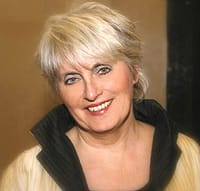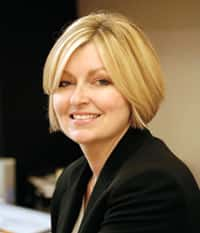Wine & Spirits
Women in wine

Women in wine
Wine & Spirits
Women in wine
There was a time when women weren't permitted to enter a
wine cellar while they had their period. Period. Men believed it would spoil the wine. Today, most of the ridiculous superstitions like that one are long gone from the enlightened world. In fact, in all areas of wine production, marketing, sales, management and governance, women now work interchangeably with men. From my vantage point, in North America, Australia, New Zealand and some parts of Europe, women's "emancipation" within the business appears to be complete. But I'm a man. Might I be getting a blinkered male view? Three high-profile women share their own experiences in the wine industry.
 Deborah Pratt, winery public relations manager, Inniskillin Wines
Deborah Pratt, winery public relations manager, Inniskillin Wines
Deborah Pratt had no plans to leave teaching when she began helping her friend Donald Ziraldo. But once she started working with him at his newly licensed Inniskillin Wines, she was completely taken aback by how exciting the wine industry was, and what tremendous potential it offered. She knew immediately she could contribute to its growth. "At the beginning, there was no credibility given to women. The wine business was a male-dominated field," she says, "but Donald was always on the leading edge." Donald travelled a lot to discover new grape varieties and marketing techniques. "On his regular visits to California, he saw women involved in the industry and the impact they had on the business," Deborah says, adding, "I came in full of confidence, knowing that all my skills applied extremely well to the marketing strategies of Inniskillin." Thirty-four years later, she's one of Inniskillin's longest-serving employees and still its biggest promoter. For young women thinking of entering the wine business, Deborah recommends learning a second language, keeping an open mind, and travelling the world to get a better perspective on both Canada and the wine business. Shari Mogk-Edwards, vice-president, merchandising, Liquor Control Board of Ontario (LCBO)
Shari Mogk-Edwards, vice-president, merchandising, Liquor Control Board of Ontario (LCBO)
If you happen to be in the North American or New World end of the business, being a woman isn’t an issue at all. “This isn’t the best way to express it, but you’re just one of the guys,” says Shari Mogk-Edwards, who was initially hired to train as one of the LCBO’s first female product consultants and has been with the board for 28 years. Travelling to some Latin countries and even in parts of France, though, Shari has run into some very traditional attitudes over the years. “I remember a visit to South America in the late 1990s and being made to feel like ‘Where’s your boss?’” However, she adds, “Such instances are becoming the exception.” In North America, she’s not treated any differently, and expectations are the same for men and women. She says, “Generally, in business, women are outnumbered by men, but that could be for a variety of reasons. Women make different choices. They often don’t need to be at the top, or prefer to balance work with family life. Women have different priorities and drivers than men.” Shari believes everything comes at a price, but that there’s also a lot of satisfaction. “It’s an industry in which women and men can perform equally well and, as time goes on, we’ll see even more women fall in love with the wine business and be successful as barriers continue to be broken down,” she says.
 Gina Gallo, senior winemaker, coastal operations, E. & J. Gallo Winery
Gina Gallo, senior winemaker, coastal operations, E. & J. Gallo Winery
Founded in 1933, E. & J. Gallo Winery is the world’s largest family-owned winery. It produces 70 million cases of wine every year in seven production facilities throughout California, manages thousands of acres of vineyards, has a portfolio of more than 60 brands, and continues to grow. “When I started working at the winery 19 years ago, all the winemakers were male,” says Gina Gallo, currently senior winemaker for the premium brands of Gallo Family Vineyards, “but as soon as my grandfather, Julio, who was certainly old school, realized how serious I was about making wine, he became very supportive. Today, being a woman in the wine world is a positive thing.” Gina adds, “The business is a great fit for women. Making wine is like raising children. Women are generally more sensitive, more nurturing and more patient.” She advises young women interested in becoming winemakers to just get in there and do it. “Don’t be afraid to make mistakes,” she says, “and as a first step, find a mentor because that will really go a long way in helping you avoid those early mistakes.”
 Deborah Pratt, winery public relations manager, Inniskillin Wines
Deborah Pratt, winery public relations manager, Inniskillin Wines
Deborah Pratt had no plans to leave teaching when she began helping her friend Donald Ziraldo. But once she started working with him at his newly licensed Inniskillin Wines, she was completely taken aback by how exciting the wine industry was, and what tremendous potential it offered. She knew immediately she could contribute to its growth. "At the beginning, there was no credibility given to women. The wine business was a male-dominated field," she says, "but Donald was always on the leading edge." Donald travelled a lot to discover new grape varieties and marketing techniques. "On his regular visits to California, he saw women involved in the industry and the impact they had on the business," Deborah says, adding, "I came in full of confidence, knowing that all my skills applied extremely well to the marketing strategies of Inniskillin." Thirty-four years later, she's one of Inniskillin's longest-serving employees and still its biggest promoter. For young women thinking of entering the wine business, Deborah recommends learning a second language, keeping an open mind, and travelling the world to get a better perspective on both Canada and the wine business.
 Shari Mogk-Edwards, vice-president, merchandising, Liquor Control Board of Ontario (LCBO)
Shari Mogk-Edwards, vice-president, merchandising, Liquor Control Board of Ontario (LCBO)
If you happen to be in the North American or New World end of the business, being a woman isn’t an issue at all. “This isn’t the best way to express it, but you’re just one of the guys,” says Shari Mogk-Edwards, who was initially hired to train as one of the LCBO’s first female product consultants and has been with the board for 28 years. Travelling to some Latin countries and even in parts of France, though, Shari has run into some very traditional attitudes over the years. “I remember a visit to South America in the late 1990s and being made to feel like ‘Where’s your boss?’” However, she adds, “Such instances are becoming the exception.” In North America, she’s not treated any differently, and expectations are the same for men and women. She says, “Generally, in business, women are outnumbered by men, but that could be for a variety of reasons. Women make different choices. They often don’t need to be at the top, or prefer to balance work with family life. Women have different priorities and drivers than men.” Shari believes everything comes at a price, but that there’s also a lot of satisfaction. “It’s an industry in which women and men can perform equally well and, as time goes on, we’ll see even more women fall in love with the wine business and be successful as barriers continue to be broken down,” she says.
 Gina Gallo, senior winemaker, coastal operations, E. & J. Gallo Winery
Gina Gallo, senior winemaker, coastal operations, E. & J. Gallo Winery Founded in 1933, E. & J. Gallo Winery is the world’s largest family-owned winery. It produces 70 million cases of wine every year in seven production facilities throughout California, manages thousands of acres of vineyards, has a portfolio of more than 60 brands, and continues to grow. “When I started working at the winery 19 years ago, all the winemakers were male,” says Gina Gallo, currently senior winemaker for the premium brands of Gallo Family Vineyards, “but as soon as my grandfather, Julio, who was certainly old school, realized how serious I was about making wine, he became very supportive. Today, being a woman in the wine world is a positive thing.” Gina adds, “The business is a great fit for women. Making wine is like raising children. Women are generally more sensitive, more nurturing and more patient.” She advises young women interested in becoming winemakers to just get in there and do it. “Don’t be afraid to make mistakes,” she says, “and as a first step, find a mentor because that will really go a long way in helping you avoid those early mistakes.”














Comments